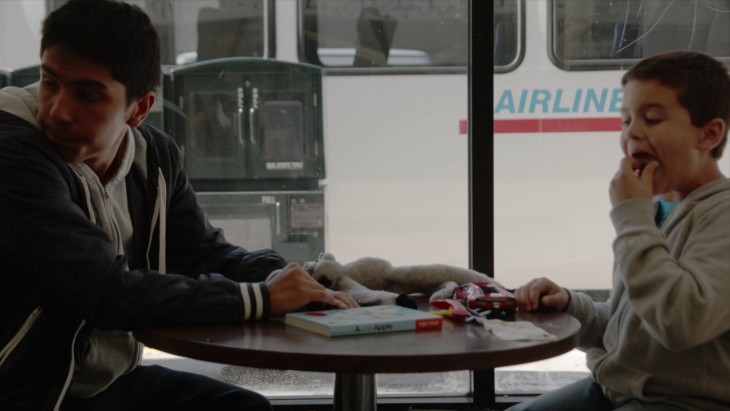
Before he was an assistant professor in San Francisco, Scott Boswell was busy taking film theory and production courses in UW-Madison’s Communication Arts Department. And thinking of the university as the place where Boswell grew his passion for cinema is all the more important given the far-flung qualities in The Day I Grew Up.
After California teen Adrian arrives home from school to find his predatory uncle out of jail, the enraged young man escapes the tainted confines of his single mother’s home with Angelo, his younger brother. But when the two arrive in the city the next morning, Adrian discovers that independence has a price and that try as he might to hide himself, there’s no running from trauma — even for an undocumented citizen.
Before Sunday’s “Wisconsin’s Own en Español” program at the Madison Museum of Contemporary Art, Boswell, who now teaches at San Francisco State University, talked about the confusing landscape of sexual identity and heritage’s relationship with language.
1. In what sense is The Day I Grew Up adapted from a true story?
The film is based on a true story. It’s inspired by the experiences of a friend of mine in California. He and I lived together in San Francisco a few years ago and after hearing stories about his childhood, I started working on a feature screenplay based on his teenage years. This short film is extracted from the feature script. Currently we’re in the development (fundraising) phase of that project.
2. In that first homecoming scene, Adrian seems more comfortable speaking English than Spanish. Was language important to you in telegraphing relationships so early on?
Yes, very important. Though undocumented, Adrian views himself as a regular American teenager, and his Spanish is something of a hand-me-down from Mom and Dad. In the casting process, we needed to find an actor who could speak imperfect, Americanized Spanish that would contrast with the fluency of his mother. At this point in Adrian’s life, I don’t think he has embraced his Mexican heritage.
3. Even after he and his brother leave for the city, Adrian never seems comfortable. What is peace for this character?
Peace for Adrian is independence and security. As a 16 year-old, he’s still exploring how he can be in control of his sexuality vis-à-vis how he was abused by his uncle’s sexuality in the past. That’s a confusing landscape to navigate, especially amidst an unsupportive family. As an undocumented person, he’s looking for his place in the world without fear of deportation to a place he’s never known. There wasn’t really time to explore that issue in the short film, but it surfaces more concretely in the feature script.
4. Adrian wants to protect his little brother, but he’s putting him in some precarious situations with his decisions. Do you see Adrian as hypocritical?
Personally, I don’t see it as hypocrisy. I see it as youthful naiveté and inexperience; Adrian’s never been responsible for someone else before, and he’s only 16. Plus, he doesn’t have the best role models at home. But yes, narratively there is some irony there, though his intentions are to protect his brother rather than hurt or abuse him.
5. You have a suggestive title because in some ways, it applies to more than one character. Who’s the “I” in The Day I Grew Up?
That’s an interesting perspective on the title. I’ve always taken for granted that it’s Adrian, largely because it marks the end of his more carefree days skateboarding and going to high school and being able to ignore the threatening presence of his uncle. But it certainly could refer to his little brother, Angelo, who is suddenly forced into this unsettling situation. I’m not sure that either the mother or uncle “grow up” at all, at least not in this version of the story.
- The Day I Grew Up plays as part of “Wisconsin’s en Español” program this Sun, Apr 12 at 11:00a in the Madison Museum of Contemporary Art. At the time of publication, tickets were still available.
